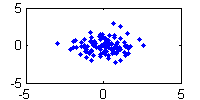Very early on in this blog (2006!), I wrote a post on memoizing functions, i.e., caching results so outputs that have already been calculated don't need to be calculated again (code included at the... 更多内容 >>
Loren on the Art of MATLABTurn ideas into MATLAB
Note
Loren on the Art of MATLAB has been archived and will not be updated.
搜索结果: Function Handles
No Infs, NaNs, or Bits 5
You may have heard the phrase "no ifs, ands, or buts" - meaning that there whatever the issue is, there is a definitive, non-negotiable answer or outcome. I heard it often when trying to persuade my parents to allow me to do something they didn't want me to do. Today when I heard someone use that phrase, what I sort of heard instead was "no |Inf|s, |NaN|s, or bits". So I will talk about those values and types today.... 更多内容 >>
The Winter of Our Vectorization 3

ContentsGoing the Whole 9 FeetEnter MATLABTime for Some Logical IndexingConvoluted, Yet SimplerFun with arrayfunPutting it All TogetherSpring into Action!Today I'd like to introduce guest blogger... 更多内容 >>
Introduction to Functional Programming with Anonymous Functions, Part 3 5

Tucker McClure is an Application Engineer with The MathWorks. He spends his time helping our customers accelerate their work with the right tools and problem-solving techniques. Today, he'll be discussing how "functional programming" can help create brief and powerful MATLAB code.... 更多内容 >>
Introduction to Functional Programming with Anonymous Functions, Part 2 14

Tucker McClure is an Application Engineer with The MathWorks. He spends his time helping our customers accelerate their work with the right tools and problem-solving techniques. Today, he'll be discussing how "functional programming" can help create brief and powerful MATLAB code.... 更多内容 >>
Introduction to Functional Programming with Anonymous Functions, Part 1 24
Tucker McClure is an Application Engineer with The MathWorks. He spends his time helping our customers accelerate their work with the right tools and problem-solving techniques. Today, he'll be discussing how "functional programming" can help create brief and powerful MATLAB code.... 更多内容 >>
Thoughts about Anonymous Functions 18
One of the reasons I like using anonymous functions is because they allow me to express whatever function I want to use as a function of the relevant arguments in different contexts.... 更多内容 >>
Delaying Evaluation of Function Inputs 8
When you call a function in MATLAB, MATLAB first evaluates all the inputs, and then passes these (possibly) computed values as the inputs. Recently Ljubomir Josifovski asked if... 更多内容 >>
Combining Functions 9
For a lot of calculations, it makes sense to combine operations into a single expression. You can sometimes do this easily when you have function handles and you generate one... 更多内容 >>
- 类别:
- Function Handles
Mathematical Recreations: Tweetable Game Of Life 10
Today I’d like to introduce a guest blogger, Matt, who is consultant over in The MathWorks UK. Some of you may have come across his customer projects and series of demos... 更多内容 >>

